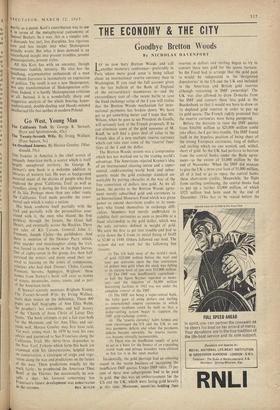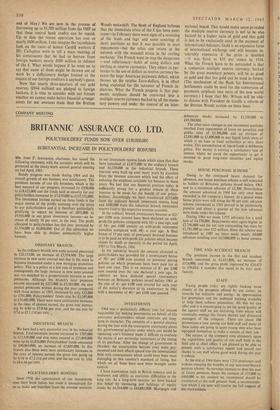THE ECONOMY & THE CITY
•
Goodbye Bretton Woods
By NICHOLAS DAVENPORT
I ET us now bury Bretton Woods and call
another monetary conference—preferably in Paris where more good sense is being talked about an international reserve currency than in Washington. If you read the full account given in the last bulletin of the Bank of England of the extraordinary manceuvres in—and the extraordinary cost of--the recent battle to save the fixed exchange value of the £ you will realise that the Bretton Woods mechanism for inter- national payments has broken down. We have got to get something better and I hope that Mr. Wilson, when he goes to see President de Gaulle, will seriously look at the French proposals. If he can eliminate some of the gold nonsense of M. Rueff, he will find a great deal of value in the French idea of a new multiple reserve currency which can take over some of the 'reserve' func- tions .of the £ and the dollar.
The Bretton Woods system was a compromise which has not worked out to the trading world's advantage. The Americans rejected Keynes's idea of an international clearing union and a super- central, credit-creating world bank and subse- quently made the gold exchange standard un- workable by putting obstacles in the way of the free conversion of dollars into gold. As we all know, the parties to the Bretton Woods agree- ment merely subscribed gold and currencies to an International Monetary Fund which was given power to extend short-term credits to its mem-• bers who found themselves in exchange diffi- c'ulties. Members had merely undtrtaken to stabilise their currencies as soon as possible at a fixed relationship to the gold dollar, which was the only currency defined in weight of gold. We were the first to get into trouble and had to write down the £ from its initial fixing of $4.03 to $2.80 in 1949. Others followed our lead. The system did not work for the following five reasons:
(I) The US held most of the world's stock of gold ($25,000 million before the war) and later put restraints upon the free conversion of dollars into gold when the stock was falling to its current level of just over $15,000 million.
(2) The IMF was insufficiently capitalised— at half the figure Keynes regarded as neces- sary—and the injection 'of $6,000 million borrowing facilities in 1(,)62 was not under the complete control of the IMF.
(3) The IMF not being a super-central bank,
the habit grew of using dollars and sterling as international reserve currencies in which payments surpluses could be held • so that a dollar-sterling system began to supplant the IMF gold-exchange system.
The 'reserve currency' habit helped and
even encouraged the • US arid the UK to run into payments deficits and when the payments deficits became unwieldy, the reserve curren- cies became virtually inconvertible.
(5) There was an insufficient supply of gold to act as a basis for the finance of an expanding world trade and private hoarders were. allowed to bid for it in the open market.
Incidentally, the gold shortage had an amusing
sequel in the recent business of increasing the insuflicient IMF quotas. Under IMF rules, 25 per cent of these new subscriptions had to be paid in gold. But this was an embarrassment for the US and the UK, which were losing gold heavily at this time. ,Moreover, countries holding their
reserves in dollars and sterling began to try to convert these into gold for the quota increase. So the Fund had to arrange that the gold paid in would be redeposited in the 'designated depositories' in the US and the UK and included in the American and British gold reserves although remaining in IMF ownership! The UK was also allowed to draw D-marks from the IMF and convert these 'into gold at the Bundesbank so that it would not have to draw on its depleted gold reserves in order to pay up its gold quota. The French rightly protested that the reserve currencies were being pampered.
Before the decision to raise the IMF quotas from $16,000 million to $21,000 million could take effect, the £ got into trouble. The IMF found itself in the hopeless position of being short of the strong European currencies, long of dollars and sterling which no one wanted, and, withal, short of gold. So the UK had perforce to borrow from the central banks under the Basle agree- ment—to the extent of $1,000 million by the end of November. When the IMF did manage to give the UK a three-year loan of $1,000 million, all of it had to go to repay the central banks these short-term credits. Meanwhile, the flight from sterling continuing, the central banks had to put up a further $3,000 million, of which $525 million had been used by the end of December. (This has to be repaid before the
end of May.) We are now in the process of borrowing up to $1,500 million from the IMF so that these central bank credits can be repaid. Up to date the rescue operation has cost us nearly £600 million. I can imagine the incredulous look on the faces of honest Cardiff workers if Mr. Callaghan were to tell a mass meeting of his constituents that he had to borrow from foreign bankers nearly £600 million in defence of the L. What would happen if he went on to say that some of them might be thrown out .of work by a deflationary budget framed at the request of our foreign creditors is anybody's guess.
Now that nearly three-quarters of our gold reserves (L844 million) are pledged to foreign bankers, it is time to consider with our friends whether we cannot make better financial arrange- ments for our overseas trade than the Bretton
Woods makeshift. The Bank of England believes that the immediate crisis of the f has been over- come—in February there were signs of a reversing of the 'leads and lags' and some covering of short positions so that It was possible to start repayments—but the crisis can return in the autumn with the seasonal strain in the sterling exchange. The French want to stop the dangerous —and inflationary—habit of using dollars and sterling as reserve currencies. They object in par- ticular to the use of dollars as reserve currency be- cause the huge American payments deficit, which throws up the surplus Euro-dollars, is in effect being exploited for the takeover of French in- dustries. What the French propose is that pay- ments surpluses should be converted into a multiple reserve currency backed by all the mone- tary powers and under the control of an inter- national board. This would make sense provided the multiple reserve currency is not to be also backed by a higher ratio of gold and that gold is not to be exclusively used in the payment of international balances. Gold is an expensive form of international exchange and will become in- tolerably expensive if the price is doubled —it was fixed at $35 per ounce in 1934. What the French have to be persuaded is that a composite multiple reserve currency, backed by the great monetary powers, will be as good as gold and that less gold can be used in future. (The mechanism of the Bank for International Settlements could be used for the conversion of payments surpluses into units of the new world currency.) I hope that Mr. Wilson will be able to discuss with President de Gaulle a reform of the Bretton Woods system on these lines.



































 Previous page
Previous page